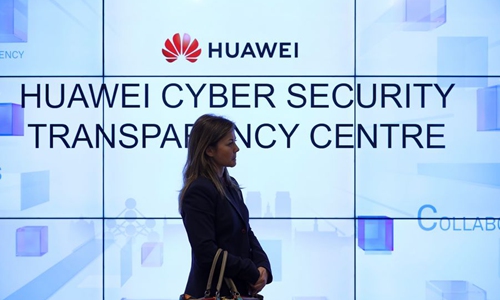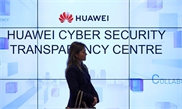Virus casts short-term shadow on Huawei’s domestic industrial chain
Virus casts short-term shadow on company’s domestic industrial chain

A woman listens to a debate at Huawei Cyber Security Transparency Center in Brussels, Belgium, on Jan. 30, 2020.(Xinhua/Zhang Cheng)
German Chancellor Angela Merkel's ruling conservatives reached an agreement to stop a ban on Huawei, a milestone for the Chinese tech giant that not only rebuffed the US' call but would also lead other countries in the EU to soon follow suit, analysts said.
According to German news outlet Die Welt, the Christian Democrat leaders have drafted a position paper, which said that instead of imposing bans on individual companies, Germany should set out a risk-management approach.
Germany's decision will lead other countries in the EU to follow suit, with most of them finalizing their decisions in the second half of this year, because 2020 is the boom year for next-generation networks using 5G, Xiang Ligang, a telecom industry expert who closely follows Huawei, told the Global Times on Thursday.
On Thursday, French Minister also said Huawei will not be barred from 5G networks, according to an AFP report.
"Huawei has survived the most difficult year, which not many firms could. The decision also shows that the EU's confidence toward the Chinese giant is also increasing as the US failed to overthrow the Chinese firm over the past year," Ma Jihua, a veteran industry analyst, told the Global Times on Thursday.
"The EU has also realized that the US has run out of tools in cracking down on Huawei," Ma added.
Germany, European's largest economy as well as the most populous EU member state, is the second major country in Europe following Britain to allow the Chinese telecom giant to help build the local 5G infrastructure.
After Germany's ruling parties reached the agreement, the Pentagon is likely to put new restrictions on Huawei, making it harder for US companies to avoid the effective ban on exports to the Chinese company, Reuters said, citing sources.
Europe has become the largest 5G market for Huawei outside China, where the company has obtained more than 60 commercial 5G contracts, with at least 32 coming from Europe.
"China's mature deployment of 5G networks puts pressure on the rest of the world, which could be reflected in the country's ongoing battle against the deadly epidemic," Xiang noted, saying that drone patrols, robotic deliveries and remote diagnosis systems are working well in China.
However, despite having secured a temporary win in overseas markets, the tech giant might face a difficult domestic situation, as the spread of the novel coronavirus pneumonia (COVID-19) might cause a disruption to its supply chain.
A Huawei supplier in East China's Jiangsu Province said that he's still waiting for the government notice to resume work, and he expected the date will be delayed to next week.
"We've already asked for a delay of shipments," the supplier, who asked to remain anonymous, told the Global Times on Thursday.
Ma noted that the epidemic might affect Huawei's phone shipments and sales in the domestic market, which could cause losses since the firm has shifted its focus to the domestic market after intensified pressure from the US.
China's first-quarter smartphone shipments could decline by more than 30 percent from the same period a year ago, according to International Data Corp.
Ma noted that the move will not influence its shipments of 5G base stations overseas, since it has both confidence and stockpiles that it prepared over the past year in the face of a potential US ban.
"There will also be a sales rebound after the virus has ended, since domestic demand has also been curbed during the period," Ma added.



